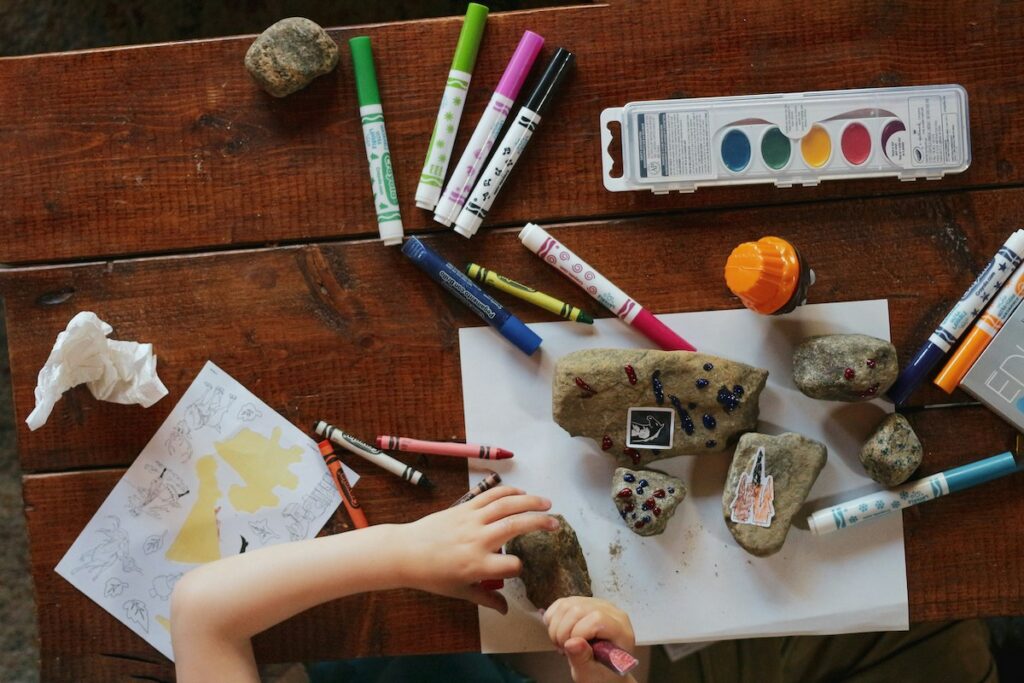Fun-Filled Educational Projects

With the world changing so fast, parents in San Antonio are constantly looking for ways to supplement their kids’ education with creative at-home learning activities. Whether it’s to reinforce what they learn in school, to explore new interests, or simply to keep their minds sharp during breaks, activities that combine fun and learning are invaluable. From setting up a mini science lab in the kitchen to unraveling the mysteries of history through role-play, kids can enjoy a diverse range of educational experiences right in the comfort of their home.
Setting the Stage for At-Home Learning Success
Creating a successful at-home learning environment involves more than just sitting children down with books. It’s about making the space inviting and conducive to learning. Parents can lay the groundwork for a productive space where kids feel comfortable and motivated.
First off, designate a specific area for learning; this helps kids transition into ‘school mode’. A quiet corner with a desk or a table gets them into the right mindset. If space is tight, even a cleared-off section of the kitchen table works. The key is consistency.
Equipment matters too. Ensure they have the basics:
- Paper
- Pencils
- Erasers
- A comfortable chair
Next, consider the value of play. Integrating educational games can make learning a hands-on way to engage with new concepts. These can range from math puzzles to history trivia, fostering both knowledge and critical thinking.
Parents should incorporate a schedule that mirrors the regularity of school. This doesn’t have to be overly rigid, but a routine guides kids to know when it’s time to focus. Block out time for different subjects and include short breaks to keep minds fresh.
Lastly, when a subject is tough, don’t hesitate to seek out online resources or tutors. Many educational platforms offer virtual lessons to supplement at-home learning, making it easier for parents who might not be experts in every subject area.
Remember, the goal is to create an atmosphere where learning is as engaging and enjoyable as possible. The right setup at home can make all the difference in maintaining children’s educational momentum outside of the classroom.
Mathematical Minds: Numbers, Shapes, and Games
Engaging San Antonio kids with the power of numbers and the intrigue of shapes can be a blast with a little creativity. It’s all about turning math from a subject into a world of discovery through stimulating games and compelling projects.
Basic Math and Geometry Through Play
In the heart of every child is a sense of playfulness that can be harnessed to introduce basic math and geometry concepts. Parents might find that pattern blocks are an excellent way to achieve this. They’re a great tool for teaching fractions, as they provide a tangible way for kids to visualize part-whole relationships. For those in the third to fifth grade range, Pattern Block Fraction Games encourage understanding through interactive fun. Additionally, children’s familiarity with puzzles can make Cut & Paste Logic Puzzles a breezy introduction to problem-solving with shapes.
- Games to Try:
- Pattern Block Fraction Games
- Cut & Paste Logic Puzzles
For younger learners, the hands-on activities and routine-based math tasks available on Math At Home cater to their developmental stage. They allow exploration of numbers and shapes within familiar playtime activities, setting a strong foundation for future learning.
- For Preschoolers and Kindergarteners:
- Activity-based learning routines
- Shape recognition games
- Fundamental counting exercises
Algebra I Tutorials for Advanced Students
For older students intent on mastering Algebra I, interactive and age-appropriate lessons ensure that advanced concepts become approachable. Online tutorials present in a more relaxed, conversational tone can make a huge difference. It mitigates the intimidation factor often associated with algebra and turns it into a challenge they’re eager to tackle. The project ideas suggested by Cuemath provide practical understanding for this age group, engaging them in real-world applications of algebra.
- Progressive Learning Tools:
- Interactive online tutorials
- Real-world project applications
Young scholars passionate about movement can integrate learning with physical activity through Active Math Games. For instance, a ‘number dance’ can make learning algebraic equations an energetic endeavor, as they jump on a mat to the correct tens and ones place in response to flash equations.
- Kinesthetic Learning Activities:
- Number dance
- Equations with physical response systems
Exploring Science from the Kitchen to the Backyard
Whether it’s concocting delicious edibles using principles of science or turning a backyard into a scientific playground, San Antonio kids have a wealth of opportunities to explore and learn. These activities promote a hands-on way of learning that combines lessons with adventure.
Molecular Gastronomy for Young Chefs
The kitchen is a fantastic lab for budding gastronomists to experiment with the chemistry of cooking. They can start with something as simple as making homemade ice cream in a bag, which provides a tasty lesson in freezing point depression. By mixing salt and ice, they create an environment that rapidly cools a mixture of cream, sugar, and vanilla, resulting in a delicious treat. For an in-depth look, they can explore kitchen science experiments with printables to guide them through various culinary projects.
Outdoor Science Adventures
The backyard provides a tremendous open-air laboratory for a variety of scientific explorations. Children can construct basic observational tools like a pool noodle periscope from backyard science experiment guides, allowing them to see the world from new angles. Exploring concepts like reflection and optics with hands-on projects promotes critical thinking and a deeper understanding of the physical world around them.
Language Arts: From Letter Recognition to Creative Writing
Navigating the journey from the basics of letter recognition to the more complex skills involved in creative writing can be made fun with the right activities and games. For kids in San Antonio who are learning from home, these language arts exercises are designed to be both educational and engaging.
Engaging with Letter Games
For the little ones just starting out, letter recognition is the foundation of literacy. Parents can set up a Letter Hunt, where kids search around the home for objects that start with a specific letter of the alphabet. It’s a tactile and visual way to get them associating letters with sounds and words. If they’re ready for a digital twist, brightwheel suggests incorporating easy preschool letter activities like a letter cup kicking game that pairs physical activity with learning.
Storytelling and Composition Exercises
Once kids have a grasp on letters and words, they can begin to form their own stories. A fun starting point is creating a Story Jar filled with prompts on slips of paper. They might pull out a character, setting, and a problem, then weave these elements into a tale. Structured composition exercises, like those found on InstructorWeb, can help kids take these ideas and develop them into full narratives with a beginning, middle, and end, while also practicing their handwriting and composition skills.
Social Studies: Time Travels and Modern Contexts
Discovering the past and understanding the present can be an adventure for kids at home. Through virtual museum tours and relevant games about current events, San Antonio youngsters can enrich their social studies learning with hands-on experiences.
History at the Museum Tour
A digital dive into history is just a click away for kids. The San Antonio Museum of Art offers enriching online experiences where children can explore ancient relics and artifacts from the comfort of home. By engaging with interactive guides and scavenger hunts tailored for young explorers, they’ll connect with cultures from around the globe, making learning both fun and memorable.
Current Events: Understanding COVID-19
Young minds can grasp the complexities of the COVID-19 pandemic through educational activities that explain the situation clearly and empathetically. With online resources such as PBS LearningMedia’s Social Studies Activities and Lessons, children are presented with real-world issues in a format they can understand, allowing them to reflect on the impact of current events in their own community and the wider world.
Physical Education and Health: Active Play and Mindfulness
Incorporating physical activity and mindfulness into daily routines is crucial for kids’ health and well-being. These engaging methods teach children how to have fun while maintaining a healthy lifestyle through movement and mental focus.
Indoor Obstacle Courses
Creating indoor obstacle courses is a dynamic way to engage kids in physical play and challenge their motor skills. Parents can use household items to set up stations that may include cushion hopping, chair limbo, or a hallway dash. This kind of play ensures kids covertly learn agility and coordination while having a blast.
Yoga and Mindfulness for Kids
Introducing children to yoga and mindfulness helps balance physical education with mental well-being. Yoga poses can be integrated with spelling or math to make learning interactive. Mindfulness can encompass simple breathing exercises or guided meditations, tying it to daily life and creating habitual attention to health.
San Antonio families are discovering that education doesn’t have to be confined to the classroom. With a wealth of resources and a little imagination, at-home learning can be a grand adventure. They can turn their living room into a reader’s theater, their backyard into a biological study, or their computer into a portal for online learning programs. These activities not only keep kids engaged but also cater to different learning styles, ensuring that whether a child is a visual, auditory, or kinesthetic learner, there’s something for everyone.
The key is to integrate learning seamlessly into activities kids already love. By doing so, parents make learning a natural part of daily life. Children may not even realize they’re learning when they’re creating art, solving puzzles, or playing interactive games. With the right approach, San Antonio parents can nurture a love of learning in their children that transcends the school environment and sets them up for a lifelong journey of discovery and growth.



